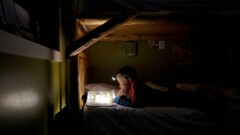Like so many other churches across the world, mine had to make a sudden and unexpected decision in the face of a pending lockdown: Do we broadcast our services or do we not? Under normal circumstances we would never even entertain the notion, but with a looming period of isolation that would last no less than weeks and that could well stretch into months, we were suddenly presented with the dilemma. We decided to “sort of” broadcast our services. Let me tell you what we settled on and why.
A Matter of Ecclesiology
Those who only watch church from afar simply cannot be full participants.
Grace Fellowship Church has always attempted to give a lot of attention to ecclesiology—the theology of church—and to carefully put that theology into practice. It is for ecclesiological reasons that we would not typically broadcast a service since we believe that assembling as a church requires physically assembling. Under normal circumstances, our concern with broadcasting a service is that it would allow people to think they are genuinely participating in church when they are actually only observing it. Those who only watch church from afar simply cannot be full participants. (We best see the physical necessity of assembling in the sacraments—while you may be able to listen to a sermon and sing along to hymns through the magic of cameras and screens, you cannot be baptized and cannot participate in the Lord’s Supper. There’s a physical component to Christian worship!) So we have displayed our convictions about ecclesiology by offering only “real” services rather than virtual ones.
But then came lockdown and now we had to face the question of broadcasting services in the new and unique context in which we could not physically assemble. Previously, those who advocated streaming our services typically did so for reasons of preference—they had the ability to physically assemble but preferred to watch at home instead. But now it was a matter of necessity—it was broadcast or nothing. The elders met and determined we would go online with a basic but still genuine worship service.
Going Online
For the first two weeks, at least two of our elders and a few other church members were able to meet at the church offices on Saturday afternoon to record a service. Keeping it basic and using a one-take format, they had a short worship service together and recorded it. In this way they were essentially a miniature of our church. They were representatives of the whole. When we watched it in our homes on Sunday morning, we were watching something that felt familiar and that had a ring of authenticity to it. These were our people worshipping together and it wasn’t too great of a stretch for the rest of us to join in.
But after the first two weeks, the government increased its pleas for people to stop mixing. The messaging was clear—they were asking households to isolate themselves from other households. Desiring to honor our governmental leaders, we followed their lead. Now, whatever we broadcast would no longer be a miniature service and would no longer include multiple representatives of the church who were physically together. Instead, one person would stand in his home and record some elements of the service while another person would stand in his home and record other elements of the service, and the pieces would later be stitched together. This felt far less familiar and felt far less authentic. It was the best we could do, but it was clear that something had changed from one week to the next.
We stopped broadcasting worship services and began broadcasting chapel services
So at this point we began to think differently about our services and decided to use some different nomenclature. It would be easy to see this as getting hung up on semantics, but we actually believe it helped clarify the matter. We stopped broadcasting worship services and began broadcasting chapel services.
Going from Church to Chapel
What’s the difference? Well, a worship service presupposes the gathering of a local church; a chapel service presupposes the gathering of something other than a local church. A worship service involves a local church physically gathering under the leadership and authority of elders so they can participate in all the elements that make up Christian worship—preaching, Scripture-reading, prayer, sacraments, fellowship, and so on. A chapel service involves an organization other than a local church gathering together without the leadership and authority of elders and, therefore, participating in only some of the elements that make up Christian worship. A chapel service may feature preaching or teaching from the Bible, it may feature singing and Scripture-reading, but it does not feature the oversight of elders or the one-another ministry of membership. Hopefully it does not feature the sacraments. While there may be some overlap between the elements of the two, they are fundamentally different. And we believed that the best we can offer our church in these strange times is something that is closer to a chapel service than a true local church worship service.
This distinction may be a fine one, but it was helpful in directing us. It resolved the question of the Lord’s Supper—we are not assembling as a local church so it would be inappropriate to attempt to celebrate the Lord’s Supper. It convicted us that we should remove some elements that are common to our normal services but that are particularly tied to local church worship, such as corporate confessions of sin and assurances of pardon. It convinced us that we should keep our services simple and basic. It freed us from having to agonize about the relatively low-quality of our audio and video production. (See more about that at Paul’s blog.) So we have welcomed people, sung a couple of songs, had a pastor pray for the congregation, read the Scripture, preached a sermon, and read a blessing from the Word. It has been as simple and basic as that.
And so, for the foreseeable future, we are providing chapel services to the people of Grace Fellowship Church. They are simple and, in their own way, rather unsatisfying. Yet they seem to be what the Lord has for us at this time and in this circumstance. At least, they are the solution we have arrived at for the time being. Even as we enjoy them for what they are, we are longing for the day when we can once again gather together in true fellowship to once again enjoy a true worship service.










